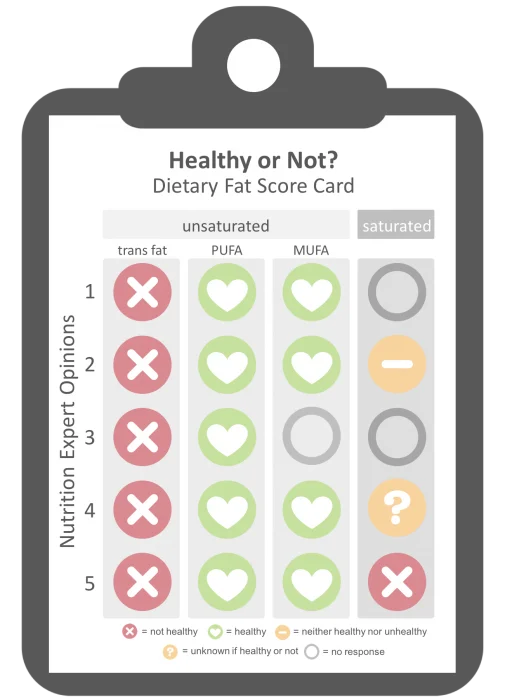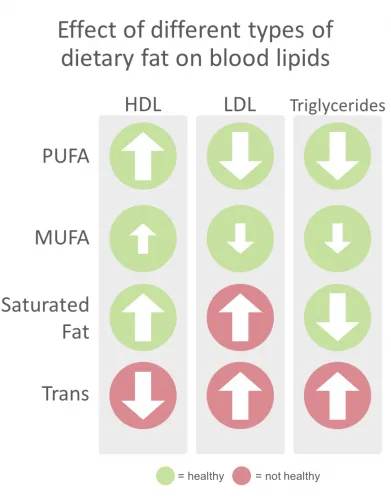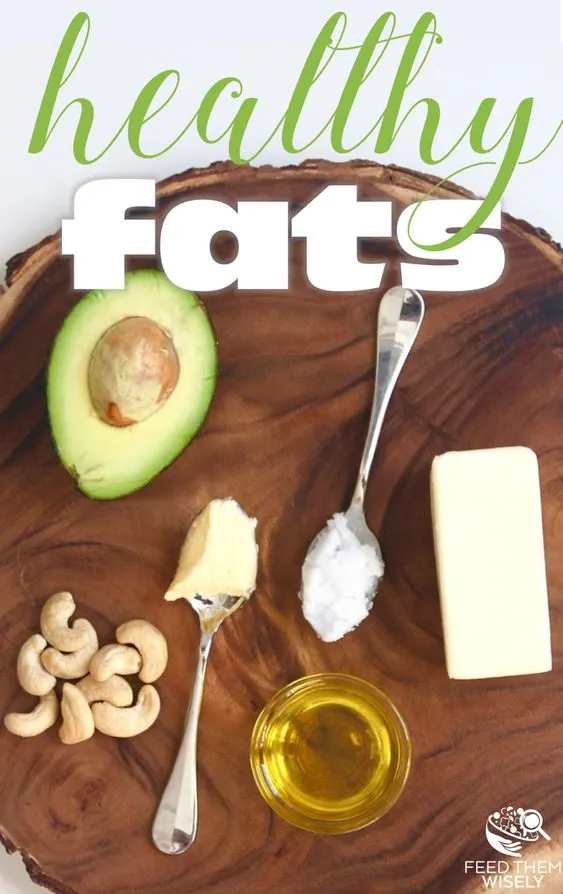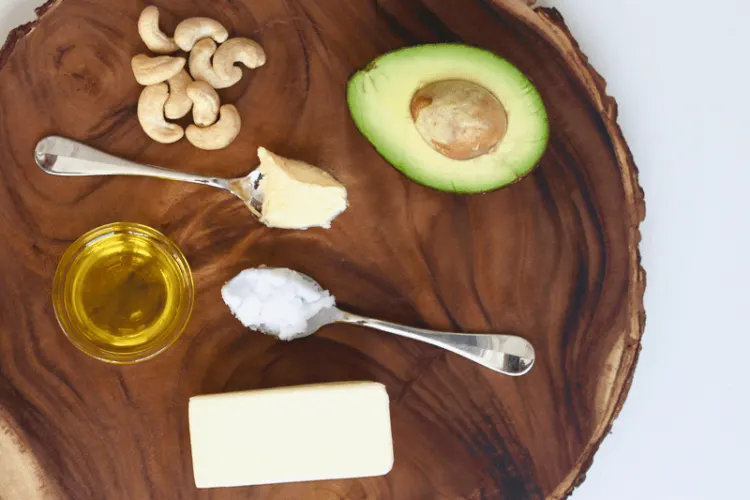Dietary fat can be a confusing and complicated topic. There are many types of fats and most foods contain a combination of them. And opinions about fats seem to always be changing. In the 1980s, fats were considered unhealthy and the recommendation was to eat a low fat diet. The dietary recommendations today are more nuanced. Some fats are considered “good”, while others are considered “bad”.
What does current research say about dietary fat? Is there such a thing as a “bad” fat and a “good” fat? And is there a “right” amount of fat to eat in our daily diet?
Nutrition experts discuss the healthfulness of dietary fats
Last month, a paper discussing the differing opinions of several preeminent nutrition experts on dietary fat was published in the journal Clinical Chemistry.(1) The experts interviewed for the paper included:
Alice Lichtenstein, DSc: Professor of Nutrition Science and Policy, The Friedman School, and Director and Senior Scientist, Cardiovascular Nutrition Laboratory, Jean Mayer USDA Human Nutrition Research Center on Aging, Tufts University
David S Ludwig, MD, PhD: Chair in Pediatric Endocrinology, Co-Director New Balance Foundation Obesity Prevention Center, Boston Children’s Hospital, Professor of Pediatrics, Harvard Medical School, Professor of Nutrition, Harvard School of Public Health
Michelle McKinley, PhD: Reader, School of Medicine, Dentistry and Biomedical Sciences, Center for Public Health, Institute for Global Food Security, Queen’s University
Rafael Perez-Escamilla, PhD: Professor of Epidemiology and Public Health, Director, Office of Public Health Practice, Director, Global Health Concentration, Yale School of Public Health
Eric Rimm, ScD: Professor of Medicine, Harvard Medical School, Channing Division of Network Medicine, Brigham and Women’s Hospital, Professor, Departments of Epidemiology and Nutrition, Harvard School of Public Health
While these experts have somewhat differing opinions about various fats, they are all well respected experts in the nutrition field. Below is a summary of their perspectives on the complex topic of dietary fat.

Avoid unhealthy trans fats
There is unanimous agreement among nutrition experts that industrial trans fats are not good for us. Industrial trans fats are man-made from hydrogenating unsaturated fat. Hydrogenation changes the chemical structure of an oil, causing a liquid oil to become solid. Note: small amounts of natural trans fats are present naturally in meat and dairy products.
There is extensive scientific data correlating industrial trans fat consumption with an increased risk of cardiovascular disease. (Read more on foods that contribute to chronic inflammation, a cause of cardiovascular disease).
Simply put, we should avoid eating foods that contain trans fat. Also, the FDA has ruled that trans fats will not be allowed in processed foods starting in June, 2018.(2)
Examples of foods that may contain industrial trans fat: margarine, packaged baked goods and snacks, fast food frying oils.
What to look for on a Nutrition Facts food label: 0 grams trans fat and ensure the ingredient list does not contain “partially hydrogenated oil.”
Other unsaturated fats are healthy fats
The nutrition experts also unanimously agree that unsaturated fats are the healthiest type of fat that we eat. There is strong epidemiological evidence that diets rich in unsaturated fats have cardio-protective properties.
There are two main categories of unsaturated fats: polyunsaturated fat (PUFA) and monounsaturated fat (MUFA). MUFA and PUFA differ in chemical structure, changing both the physical characteristics of the fats and how our bodies respond after consuming them. However, it is worth noting that most food sources of unsaturated fat contain a mixture of PUFAs and MUFAs and that it is virtually impossible to separate out the health benefits of each fat.
Monounsaturated fat
Monounsaturated fats (MUFA) contain a single double bond in their chemical backbone. MUFA are liquid at room temperature, but tend to thicken or become solid upon refrigeration. Monounsaturated fats are an important component of our body’s cells.
Examples of foods that are good sources of monounsaturated fat: avocados, almonds, cashews, peanuts, and oils including olive oil, safflower oil, and avocado oil.3
Polyunsaturated fat
Polyunsaturated fats (PUFA), contain two or more double bonds in their chemical backbone. Like MUFA, oils containing high levels of PUFA are liquid at room temperature, thicken upon refrigeration, and are important components of our cells.
Included in the category of polyunsaturated fats are the omega-3 and omega-6 fatty acids. Both are considered essential fatty acids because our bodies do not make them and so they must be obtained from our diet.
Examples of foods that are good sources of polyunsaturated fat: oily fish (like salmon), tahini, flax seed, chia seed, pine nuts, walnuts, and cooking oils made from soybean, and corn.(3)
Saturated Fat, in moderation, can be part of a healthy diet
There is not a clear consensus from the nutritional experts on saturated fat. Expert opinion ranges from saturated fat being “bad” to relatively neutral. However, none of the experts say that saturated fat is a healthy fat. And all experts interviewed for the paper agree that polyunsatruated fats are healthier than saturated fat.
“Replacing saturated fat with unsaturated fat (particularly PUFA) is associated with lower risk of cardiovascular disease, all-cause mortality, and more favorable plasma lipid profiles.” Alice Lichtenstein
Saturated fat has a relatively neutral effect on cardiovascular disease risk compared to the prevailing American diet.” David Ludwig
“Saturated fat is an unhealthy fat.” Eric Rimm
Key takeaway: small amounts of saturated fat may be a part of a healthy diet. However, limit the amount of processed foods that you eat because they are often sources of saturated fat and other unhealthy ingredients.
Examples of foods that can contain saturated fat: dairy foods, meat, processed foods like pizza and bakery goods.
How different types of dietary fat impact our blood lipids
Broadly speaking, blood lipids are the fats in our blood. When you have a blood test to measure cholesterol, two types of cholesterol (HDL and LDL) and triglycerides are typically measured. High density lipoprotein (HDL) cholesterol is considered the “good” cholesterol and low density lipoprotein (LDL) cholesterol is considered “bad” cholesterol. Triglycerides store excess energy from the foods we eat, and high levels can increase your risk of coronary heart disease.(4)
There is agreement among the interviewed nutrition experts regarding the effect of various types of dietary fat on our blood lipids. This is because there is an extensive amount of research studying how diet affects blood lipid profiles.
However, it is important to note that these changes in blood lipid levels only come about when the fats are consumed in place of other sources of energy (such as carbohydrates or refined grains).
“Just increasing ‘healthy’ fat without cutting down on other sources of energy will result in weight gain and associated adverse effects.” Alice Lichtenstein

When PUFA is exchanged for equal calories from carbohydrate, HDL-cholesterol increases and both LDL-cholesterol and triglyceride levels decrease. MUFA is similarly beneficial, though its effects are not as strong as PUFA. Though saturated fat can increase levels of HDL-cholesterol and decrease triglycerides, ithas been shown to consistently raise LDL-cholesterol. Trans fats are the worst for our health because they decrease HDL-cholesterol, and increase LDL-cholesterol and triglyceride levels.(5)
What is maximum amount of fat we should eat daily?
Back in the 80s, the recommendation was for dietary fat to comprise less than 30% of our daily caloric intake. By 1995, this limit increased to 35%. Today, the Dietary Guidelines for Americans does not make a specific recommendation for an upper limit on calories from fat. However, the Guidelines do recommend that 10% or less of our daily calories come from saturated fat.(3)
“There is not an evidence base for limiting total fat in the diet.” Eric Rimm
“There is no biological basis for an upper limit on dietary fat.” David Ludwig
“The scientific evidence clearly shows that what matters most for health is the type of fat and not the total amount of fat in the diet.” Rafael Perez-Escamilla
“Yes, I think there should be an upper limit on total fat intake to achieve a balanced intake of other macro- and micronutrients and to alleviate risk of chronic diseases. What this upper limit should be is still a work in progress.” Michelle McKinley
Key takeaway: Unsaturated fats are a key component of a healthy diet. In moderation, saturated fats can also be a part of a healthy lifestyle.
Conclusions about Dietary Fat
With the exception of industrial trans fat, there is a place for moderate levels of dietary fat in a healthy lifestyle. Look to eat a varied diet filled with nutrient rich foods. Seeds, nuts, oily fish, olive and avocado oils are all excellent sources of unsaturated fat. Also, saturated fat from dairy foods and meat can also be enjoyed in moderation.
Pin article for later:

References:
- Dietary Fat: Friend or Foe? Cara B. Ebbeling, Ian S. Young, Alice H. Lichtenstein, David S. Ludwig, Michelle McKinley, Rafael Perez-Escamilla, and Eric Rimm. Clinical Chemistry 2018; 64:1 (link)
- Final Determination Regarding Partially Hydrogenated Oils (Removing Trans Fats), FDA Website (link)
- Dietary Guidelines for Americans, 2015-2020, Eighth Ed. (link)
- HDL (Good), LDL (Bad) Cholesterol and Triglycerides, American Heart Association Website (link)
- Triglycerides: Frequently Asked Questions, American Heart Association Website (link)

Fred Lander
Thursday 19th of January 2023
Dr. Sarah Hallberg pointed out in one of her presentations before she passed away that eating saturated fat will actually lower the amount of saturated fat in our blood. I think the presentation was titled something like "We are not what we eat ". I double checked in the pubmed database and there is evidence to back that up.
Peter Hyperlipid spent about 10 years investigating the matter of saturated fat and unsaturated fat and eventually found good evidence the unsaturated fats were upsetting essential signaling in the mitochondria. A certain amount of oxidation is part of our evolutionary heritage, and involved in the signaling, but when we go far outside the familiarity we experienced over millions of years then the consequences can be fatal.
Thursday 27th of December 2018
Good article! Thnx